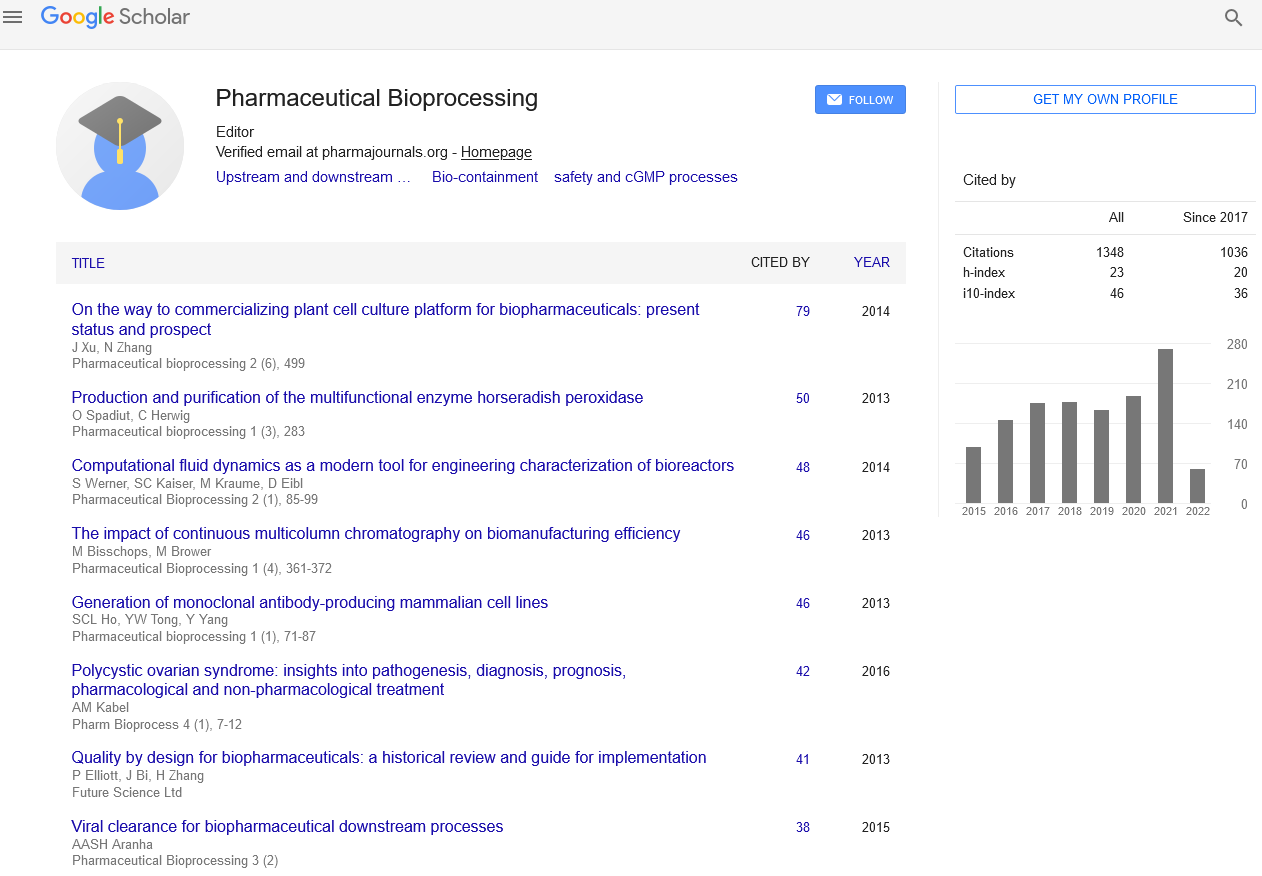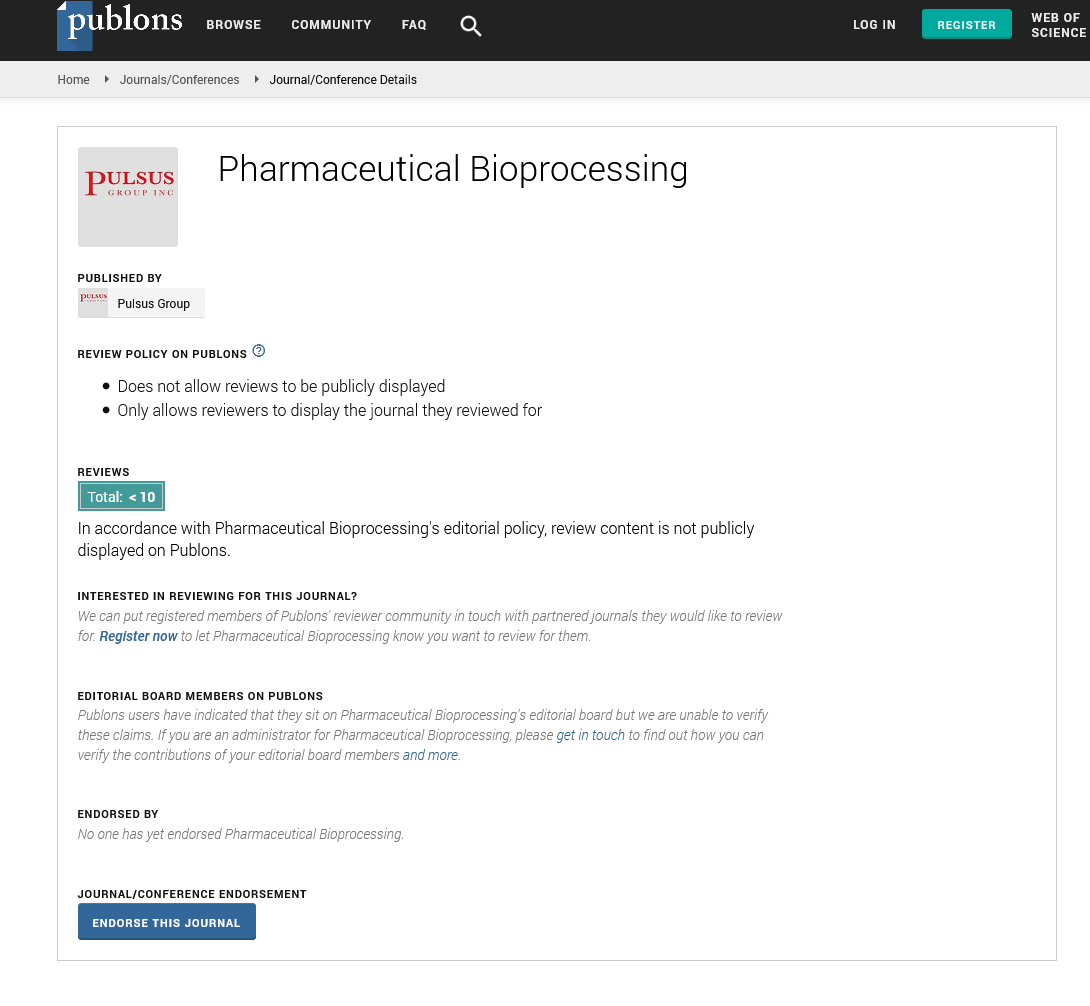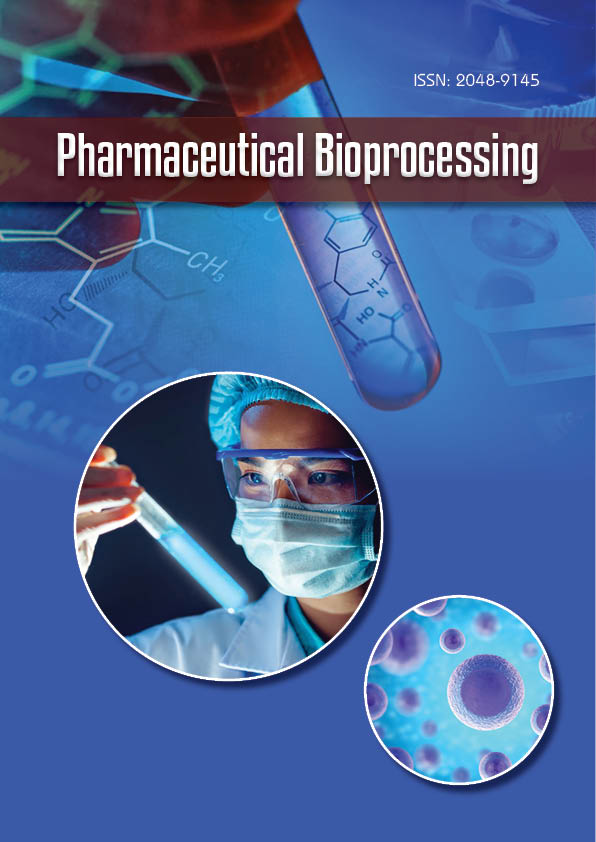Perspective - Pharmaceutical Bioprocessing (2023) Volume 11, Issue 6
Bioprocessing: Revolutionizing Medicine and Industry through Biological Production
- Corresponding Author:
- Kashyap Kumar
Department of Biotechnology,
Mahendra Medical University,
New Delhi,
India
E-mail: kashypkumar@gmail.com
Received: 13-Nov-2023, Manuscript No. FMPB-23-120754; Editor assigned: 17-Nov-2023, PreQC No. FMPB-23-120754 (PQ); Reviewed: 01-Dec-2023, QC No. FMPB-23-120754; Revised: 18-Dec-2023, Manuscript No. FMPB-23-120754 (R); Published: 26-Dec-2023, DOI: 10.37532/2048-9145.2023.11(6).124-125
Introduction
Bioprocessing, a crucial facet of modern biotechnology, has emerged as a transformative force in the production of pharmaceuticals, biofuels, and a range of valuable bioproducts. This dynamic field harnesses the power of living cells, microorganisms, and biological systems to manufacture products that impact various industries. In this article, we will explore the fundamental principles of bioprocessing, its applications, and the significant contributions it makes to medicine, energy, and beyond.
Description
Understanding bioprocessing
Bioprocessing refers to the use of biological systems, such as cells or enzymes, to carry out complex chemical transformations. Unlike traditional chemical manufacturing, which often relies on harsh conditions and non-renewable resources, bioprocessing leverages the inherent capabilities of living organisms to produce desired compounds. This field encompasses a wide range of processes, from the cultivation of microorganisms to the extraction of valuable bioproducts.
Key components of bioprocessing
Microbial cultivation: At the core of many bioprocessing operations is the cultivation of microorganisms, such as bacteria, yeast, or algae. These microorganisms serve as factories for the production of proteins, enzymes, and other bioproducts. Optimizing the growth conditions, including temperature, nutrient supply, and aeration, is crucial to achieving high yields.
Fermentation: Fermentation is a key bioprocessing technique involving the controlled growth of microorganisms under specific conditions to produce desired products. This process is widely used in the production of antibiotics, vaccines, and biofuels. The choice of fermentation strategy, whether batch, fed-batch, or continuous, depends on the characteristics of the microorganism and the desired product.
Downstream processing: Once the desired bioproduct is produced, downstream processing involves the separation, purification, and refinement of the product from the fermentation broth. Techniques such as chromatography, filtration, and centrifugation are employed to isolate and purify the target compound. This step is crucial to ensuring the final product meets the required quality and regulatory standards.
Applications in medicine
Bioprocessing plays a pivotal role in the pharmaceutical industry, where the production of biopharmaceuticals has become increasingly prevalent. Biopharmaceuticals include protein-based drugs, monoclonal antibodies, and vaccines, among others. Here’s how bioprocessing contributes to the development of these life-saving medications:
Monoclonal antibodies: Bioprocessing is central to the production of monoclonal antibodies, which are used in the treatment of various diseases, including cancer and autoimmune disorders.
Cultured mammalian cells are often employed to produce these complex proteins, and sophisticated bioprocessing techniques ensure high yields and product purity.
Vaccine production: The d evelopment a nd manufacturing of vaccines heavily rely on bioprocessing. From cultivating the specific strains of viruses or bacteria needed for vaccine production to downstream processing for purification, bioprocessing ensures the efficient and safe production of vaccines that protect against infectious diseases.
Industrial biotechnology and biofuels
Beyond medicine, bioprocessing plays a crucial role in industrial biotechnology and the production of biofuels. The use of renewable biological resources offers a more sustainable and environmentally friendly alternative to traditional industrial processes:
Biofuels: Bioprocessing is at the forefront of the biofuel revolution. Microorganisms such as yeast and bacteria are engineered to convert sugars from renewable feedstocks, such as corn or sugarcane, into biofuels like ethanol and biodiesel. This sustainable approach contributes to reducing reliance on fossil fuels and mitigating the environmental impact of transportation.
Challenges and innovations in bioprocessing
While bioprocessing has revolutionized the production of a wide array of products, it is not without challenges. Some key challenges include:
Process optimization: Achieving optimal conditions for microbial growth and product formation is a complex task. Process optimization requires a deep understanding of the biology of the organisms involved, and iterative improvements are often needed to enhance yields and productivity.
Scale-up challenges: Moving from laboratoryscale bioprocessing to large-scale industrial production poses challenges related to maintaining consistent product quality, addressing mass transfer issues, and ensuring the scalability of fermentation processes.
Purification complexity: Downstream processing, especially for biopharmaceuticals, can be complex and costly. Developing efficient purification strategies while maintaining product integrity is a constant focus of innovation in bioprocessing.
In response to these challenges, ongoing research and technological advancements continue to drive innovations in bioprocessing:
Single-use bioreactors: Single-use bioreactors, which eliminate the need for cleaning and sterilization between batches, are gaining popularity in bioprocessing. These systems enhance flexibility, reduce the risk of contamination and streamline the scale-up process.
Advanced analytics and monitoring: The integration of advanced analytics and monitoring tools, including online sensors and data analytics, allows real-time monitoring of bioprocess parameters. This facilitates better process control, quicker decision-making, and improved overall efficiency.
CRISPR-based bioprocessing: The application of CRISPR gene-editing technology to improve microbial strains used in bioprocessing is an area of active research. This technology enables precise modifications to microbial genomes, enhancing their productivity and resilience.
Conclusion
Bioprocessing stands as a dynamic and indispensable field, bridging the realms of biology, engineering, and industry. From the production of life-saving pharmaceuticals to the development of sustainable biofuels, bioprocessing continues to shape the landscape of modern biotechnology. As research and innovation propel the field forward, the potential for bioprocessing to address global challenges, from healthcare to environmental sustainability, remains vast. As we look to the future, the continued integration of biological systems into industrial processes holds the promise of a more sustainable, efficient and biologically inspired approach to production across diverse sectors.


